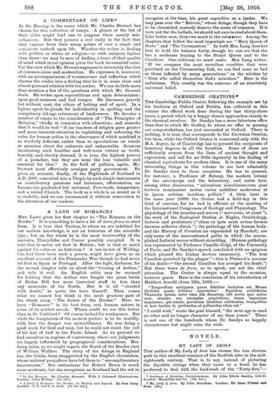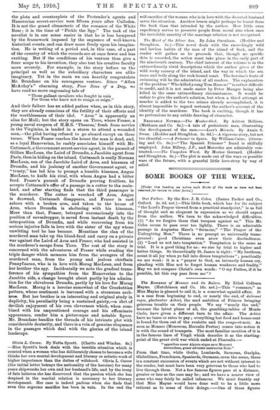NOVELS.
MY LADY OF AROS.t THE author of My Lady of Bros has chosen the leas obvious path in this excellent romance of the Scottish isles in the mid- eighteenth century. That is to say, instead of picturing the Jacobite risings when they came to a head, he has preferred to deal with the backwash of the "Forty-five,"— • Orationes et Bpistotae Cantabrigienses. By John Edwin Sandys, Litt.D. London : Macmillan and Co. [103. net.] t My Lady of Ares. By John Bntndano. London: Sir Isaac Pitman sad Sons. [ea.] the plots and counterplots of the Pretender's agents and Hanoverian secret-service men fifteen years after Culloden. It is not the grand climacteric of the romance of the White Rose ; it is the time of " Pickle the Spy." The task of the novelist is in one sense easier in that he is less hampered by the framework imposed by the sequence of well-known historical events, and can draw more freely upon his imagina- tion. He is writing of a period and, in this case, of a part of the country of which the records are at once fewer and less exciting. But if the conditions of his venture thus give a freer scope to his invention, they also test his creative faculty more severely. For example, in the story before us the principal as well as the subsidiary characters are alike imaginary. Yet in the main we can heartily congratulate Mr. Brandane on his courageous venture. Since "Allan McAulay's " charming story, Poor Sons of a Day, we have read no more engrossing tale of
" Those gallant cavaliers who fought in vain
For those who knew not to resign or reign."
And their failure has an added pathos when, as in this story, they are already conscious of the futility of their efforts and the worthlessness of their idol. "Aros " is apparently an alias for Mull; but the story opens on Tiree, where Fraser, a young naval surgeon of H.M.S. Theseus,' fresh from service in the Virginias, is landed in a storm to attend a wounded man,—the pilot having refused to go aboard except on these terms. When Fraser reaches the house the man is dead, and, as a loyal Hanoverian, he rashly associates himself with Mr. Cattanach, a Government secret-service agent, in the pursuit of Gillian MacLean, the Laird of Drumfin, a Jacobite agent from Paris, then in hiding on the island. Cattanach is really Norman MacLean, son of the Jacobite Laird of Aros, and kinsman of Drumfin, and his jealousy of another Government agent, or "trusty," has led him to prompt a humble kinsman, Angus MacLean, to knife his rival, with whom Angus had a bitter feud. Fraser's pursuit of Drumfin proving fruitless, he accepts Cattanach's offer of a passage in a cutter to the main- land, and after starting finds that the third passenger is the murderer. The cutter is wrecked off Aros, Angus is drowned, Cattanach disappears, and Fraser is cast ashore with a broken arm, and taken to the house of Aros, where Drumlin is sheltering with his kinsman. More than that, Fraser, betrayed unconsciously into the position of eavesdropper, is saved from instant death by the interposition of Drumfin, and while recovering from his serious injuries falls in love with the sister of the spy whose unwitting tool he has become. Meantime the clan of the murdered man take up the blood-feud and carry on a private war against the Laird of Aros and Fraser, who had assisted in the murderer's escape from Time. The rest of the story is concerned with the adventures of Fraser while evading the triple danger which menaces him from the avengers of the murdered man, from the young and jealous chieftain Pennyfuaran, who is in love with Morag MacLean, and from her brother the spy. Incidentally we note the gradual trans- ference of his sympathies from the Hanoverian to the Jacobite side, a change brought about partly by his admira- tion for the chivalrous Drumlin, partly by his love for Morag MacLean. Morag is a heroine somewhat of the Crockettian pattern, whose sentiment is leavened with a. strenuous arch- ness. But her brother is an interesting and original study in duplicity, his peculiarity being a sustained gaiety,—a sort of devilish enjoyment of his own cleverness which, when com- bined with his unquestioned courage and his effeminate appearance, render him a picturesque and notable figure. Mr. Brandane handles the threads of his intricate plot with considerable dexterity, and there is a vein of genuine eloquence in the passages which deal with the glories of the island landscape.















































 Previous page
Previous page